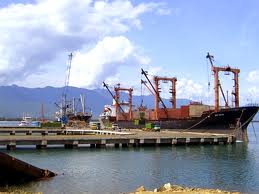
| Work starts on int’l port in Haiphong | |
The Ministry of Transport on Sunday started construction of component A of Haiphong International Gateway Seaport, or Lach Huyen Port, in Cat Hai District in the northern coastal city of Haiphong for completion in 2016. The project is divided into two components, of which component A features infrastructure works of sea passages, breakwaters, wharfs and roads, the construction ministry said in a statement. Component A requires an estimated cost of VND18.6 trillion or roughly US$900 million which will be funded from Japan’s ODA loans and State budget under the public-private partnership format. Component B consists of two quays with a combined length of 750 meters along with handling equipment for container ships weighing up to 100,000 DWT. Total investment of the component is around VND6.5 trillion. Component A will be complete and operational in 2016 to help reduce overload at the current Haiphong Seaport. Total cargo throughput to be handled by northern seaports will be between 146 million tons and 176 million tons annually by 2020, the Vietnam Maritime Administration reports. However, total capacity of the existing seaports only reaches 86-90 million tons in 2015 even after they are upgraded and expanded while it is impossible to develop these facilities further to meet rising transport demand in Asia. Therefore, construction of Lach Huyen Port is aimed at satisfying fast-growing sea transport demand in the country’s north. Also, with the presence of the deep water seaport, import and export commodities from Vietnam will be able to go straight to Europe and America without transshipments in Singapore or Hong Kong. Lach Huyen Port will be a national port complex and an international gateway in the north as per a master zoning plan on developing seaport systems in the country by 2020. It took the ministry up to nine years to make preparations for the scheme, including four years for studying and completing the detailed zoning plan, three years considering, assessing and approving the project and two years making the detailed design and bidding procedures. | |
| The Saigon Times Daily |
